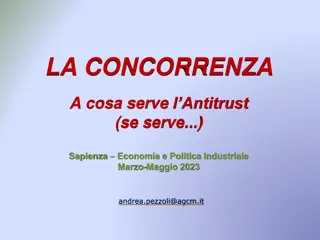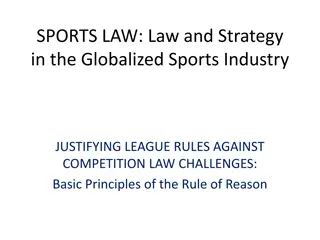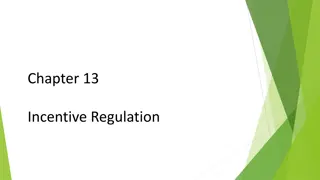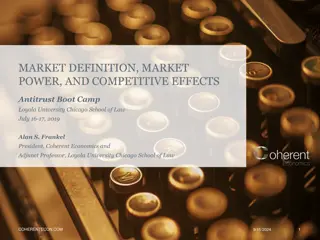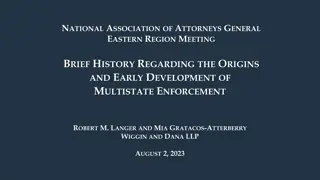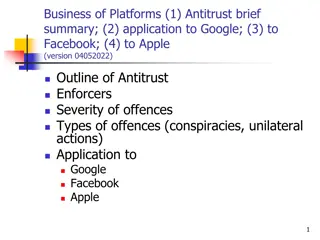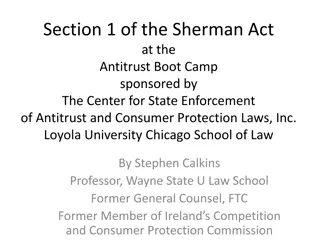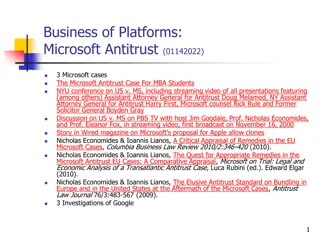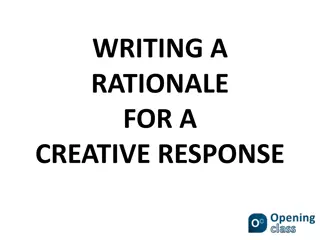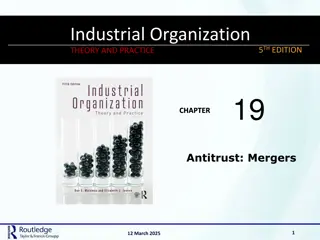
Rationale for Regulation and Antitrust Policies
Regulation and antitrust policies address departures from the perfect competition paradigm by establishing incentives or controlling behavior to prevent market failures and limit market power. Antitrust regulations have evolved to address concerns such as monopolies, mergers, and financial transactions that influence market behavior.
Download Presentation

Please find below an Image/Link to download the presentation.
The content on the website is provided AS IS for your information and personal use only. It may not be sold, licensed, or shared on other websites without obtaining consent from the author. If you encounter any issues during the download, it is possible that the publisher has removed the file from their server.
You are allowed to download the files provided on this website for personal or commercial use, subject to the condition that they are used lawfully. All files are the property of their respective owners.
The content on the website is provided AS IS for your information and personal use only. It may not be sold, licensed, or shared on other websites without obtaining consent from the author.
E N D
Presentation Transcript
Chapter 1 Introduction
Regulation and antitrust policies are needed because we do not exist in a world that functions in accordance with the perfect competition paradigm Departures from the perfect competitive model are addressed in two ways: by establishing incentives through a pricing mechanism or by controlling behavior directly through explicit governmental actions designed to discourage certain behavior, such as creating a complex web of regulations that prevents public utilities from charging excessive rates for their services Sometimes individuals contribute to market failure even though it is assumed the actions of firms cause all market failures
The overall impact of antitrust policies has not changed markedly over the past century The intent of antitrust policies is to limit the role of market power that might result from substantial concentration in a particular industry What has changed is that the concerns have shifted from the rise of single monopolies to mergers, leveraged buyouts, and other financial transactions that combine and restructure corporations in a manner that might fundamentally influence market behavior
Because of the control over the price exerted by a monopoly, there are economic efficiency losses to society such as a negative impact on product quality and diversity The theory of contestable markets Achieving a monopolistic position Do monopolies promote or deter innovation?
A monopolistic market structure can be either desirable or undesirable, dependent on economic efficiency and equity Explain what s good for General Motors is not necessarily good for America Some kinds of regulation affect energy prices and minimum wage levels
Development of Economic Regulation The Interstate Commerce Commission The Federal Communications Commission and the Securities and Exchange Commission The main thrust of these efforts has been to prevent the development of the kinds of market concentration that threaten the competitive role of markets
The difficulty of establishing a rate structure that will provide efficient incentives for all parties We must strike a delicate balance between providing sufficient incentives for firms to undertake cost-reducing actions while at the same time ensuring that the prices for consumers are not excessive. Marginal costs and fixed costs It is seldom possible to replicate an efficient market perfectly
The role of economic analysis in policy discussions Alfred E. Kahn: prominent regulatory economist responsible for the deregulation of the airlines In the case of economic regulation, the application of economic reasoning is quite explicit. Economists play a prominent role in these regulatory agencies
In the 1970s the U.S. Congress created a host of agencies concerned with regulating health, safety, and environmental quality The impetus for these regulation is twofold Substantial externalities often result from economic behavior Individual consumption decisions and informational issues also play an important role It is largely through the efforts of government agencies that society has funded research into the implications of various kinds of hazards
Role of the Courts Common-law requirements Liability issues There has been a steadily increasing reliance on the courts to foster changes in products, including lead paint, guns, cigarettes, breast implants, and fast food The lines between regulation and litigation have become blurred
Ideally, the purpose of antitrust and regulation policies is to foster improvements judged in efficiency terms or, in other words, to maximize the net benefits of these regulations to society Benefit-cost calculus Understanding how regulations function in our market economy will help illuminate who wins and who loses from regulatory policies, and to what extent
Regulators respond to a variety of political constituencies, such as irrational pressures The strong private interest in regulatory outcomes The net result of these private interests is that regulatory policies frequently do not perform in the manner that economists would expect in an ideal world George Stigler: Nobel laureate who demonstrated the relationship between economic regulation and private interests Government failure

